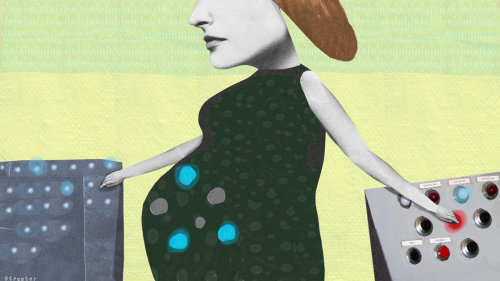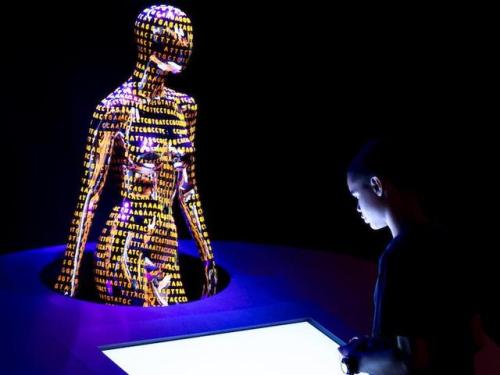#epigenetics
How A Pregnant Woman’s Choices Could Shape A Child’s Health
Pregnant women hear a lot about things they should avoid: alcohol, tobacco, chemical exposures, stress. All of those have the potential to affect a developing fetus. And now scientists are beginning to understand why.
One important factor, they say, is something called epigenetics, which involves the mechanisms that turn individual genes on and off in a cell.
There’s growing evidence that epigenetics is critical in determining a child’s risk of developing problems ranging from autism to diabetes, says Dani Fallin, who studies the genetics of mental disorders at Johns Hopkins Bloomberg School of Public Health.
Epigenetic control of genes is part of what allows a tiny cluster of identical cells in the womb to grow into a fully formed baby. By switching certain genes on and off, some cells become heart cells while others become brain cells.
It’s a delicate process that can be disrupted by exposure to certain chemicals or hormones, says Susan Kay Murphy, an associate professor of obstetrics and gynecology at Duke University School of Medicine. And the first week or so after conception appears to be “a particularly vulnerable time where environmental influences can directly affect an epigenetic outcome,” she says.
Murphy’s interest in epigenetics is personal as well as professional. She entered the field in the 1990s after her young son died from a rare form of liver cancer that has been linked to epigenetic changes. She also has a son with autism and a daughter with ADHD.
Illustration by Katherine Streeter for NPR
Post link
How workers can become queens
A honey bee’s fate is decided at birth. The larvae develop to become a queen or a worker. If you’re born a queen, you get to rule the hive.
But other insects are more flexible.
For example, paper wasps and dinosaur ants are able to switch role from worker to queen at any point in their life - and new research uncovers the basis of this flexibility.
Researchers from the University of Bristol, the Babraham Institute and the Centre for Genomic Regulation analysed individual wasp and ant brains from queens and workers of both species to see whether caste differences could be explained by variations in how the genome is ‘read’ and regulated.In the paper wasps as seen in the video above, the queen is identifiable by behaviours such as shaking the abdomen and aggression to exert dominance.
By looking at the genetic makeup of the insects, the researchers were able to determine what genetic influences were controlling behaviour.
They found very little difference between roles, which was surprising given that hundreds of genes are involved in determining the differences between queens and workers in the honeybee.
This suggests that there is no single master gene determining the role of these wasps and ants.
So you don’t have to be born a queen after all…
Video: Solenn Patalano
Mom’s in control – even before you’re born
Researchers have uncovered a way in which information contained in unfertilised eggs influences the development of the fetus and placenta during pregnancy.
The research, performed in mice, indicates that even before conception a mother’s health may influence the health of her fetus.
Epigenetic information is critical for determining which genes are turned on and off in our DNA.
The researchers discovered that some epigenetic ‘marks’ laid down in eggs during their development in the ovaries and after fertilisation are passed onto the fetus and placenta.
The findings suggest that mothers have the genetic tools to control the growth of their offspring during pregnancy by instructing placental development.
Image credit: lunar caustic
Post link

Cellular Manipulation seal
[Digital Talisman]
Blood activation:
clench the teeth, then open the mouth wide
make the Ushas Mudra
- Inner cauldron awaken! Transmogrify, mutate, evolve however you see fit…
Epigenetics and Time Acceleration
The Weird Age of “Previvors” Is Coming
Posted by Brian Gallagher
Siddhartha Mukherjee has an arresting thought experiment: What if, along with your familiar elementary-school report card, you had a genetic report card—one that read out your propensity for getting each letter grade in each subject? If you get an A in math, and your genetic report card says that your propensity for getting that grade is 7 percent, would that change your evaluation of your performance? What if your propensity was 97 percent?
Such perplexing, and perhaps uncomfortable, questions lie on the horizon, Mukherjee told Nautilus recently, in his Ingenious interview. He’s the author of The Gene: An Intimate History, published last year. He contends that genetics is a destabilizing idea in our culture: “What if I begin to understand you as pixels of information that change your leanings and propensities toward one future fate or another fate?” The more we understand the impact of genes on all sorts propensities—to have a mental illness, to have cancer, or to have certain behaviors and traits—the more it seems we must rethink what we mean by fate, chance, and responsibility. Destiny will no longer appear as something opaque and amorphous, like “a gray cloud,” he says. Instead, “we can begin to speak about it…in terms of very incisive information about particular genomes correlating or coexisting with particular environments.”
Post link
New #comicbook alert!
Be wooed by the amazing things our #gutmicrobiomes do in this lovely #blackandwhite comic by #uwgrad @zenyattacomics and #phdstudent Sydney Thomas!
.
Sydney is a #gradstudent in the Denu lab at @uwmadison learning about #epigenetics and Amy is an #artist and research specialist at the Wisconsin primate center!
Go to jkxcomics.com/youarewhatyoueat to read now!
.
.
.
#science #comics #sciencecomics #bacteria #research #phdlife #dnafolding #cells #YouAreWhatYouEat #jkxcomics
https://www.instagram.com/p/B6GT5Z3psUY/?igshid=1tgxrp3vlh76b
Post link





